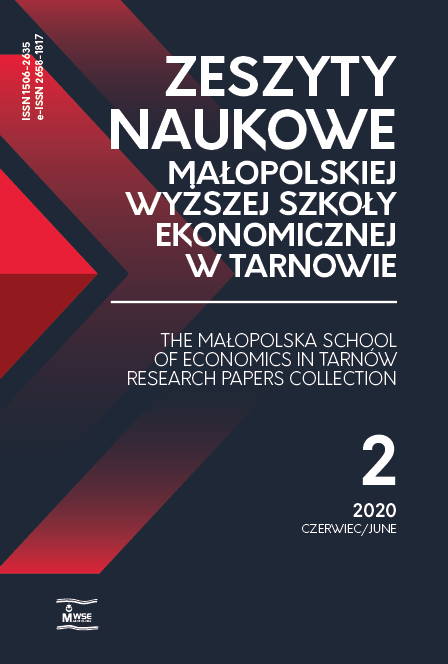Abstract
The aim of this paper is to investigate the attractiveness of city break trips as a form of urban (cognitive) tourism. The study focuses on the following research questions: What factors influence the popularity of city break trips? Which cities are most often chosen as destinations for short-term holidays? What factors determine the choice of these cities? Which city attractions appeal to city break visitors? How are city breaks organized? These research questions were investigated through desk-based analysis of literaturę on urban tourist destination attractiveness and the determinants of city break trend development as well as an online diagnostic survey which involved 184 respondents actively participating in tourism. The study shows that the main reasons for taking a city break trip is the desire to “escape from everyday life routine”, “sightseeing” and “relaxation”. Cities in Poland were more popular destinations than cities abroad and they were usually reached by train or car. City break visitors most often visited historical sites and looked for off-the-beaten-track places. The main reason for choosing a particular destination was the desire to see something new. Research topic and issues testify to the originality of the selected research area.
References
Ashworth, G., Page, S. J. (2011). Urban tourism research: Recent progress and current paradoxes. Tourism Management, 32(1), 1–15. DOI: 10.1016/j.tourman.2010.02.002.
View in Google Scholar
Awedyk, M., Makarewicz, M., Weltrowska, J. (2013). Indywidualne city break jako reprezentacyjny trend turystyki europejskiej w XXI wieku. Prace Naukowe Uniwersytetu Ekonomicznego we Wrocławiu, 304, 11–18.
View in Google Scholar
Boivin, M., Tanguay, G. A. (2019). Analysis of the determinants of urban tourism attractiveness: The case of Québec City and Bordeaux. Journal of Destination Marketing & Management, 11, 67–79. DOI: 10.1016/j.jdmm.2018.11.002.
View in Google Scholar
Bouchon, F., Rauscher, M. (2019). Cities and tourism, a love and hate story: Towards a conceptual framework for urban overtourism management. International Journal of Tourism Cities, 5(4), 598–619. DOI: 10.1108/IJTC-06-2019-0080.
View in Google Scholar
Charterina, J., Aparicio, G. (2015). A comparison of antecedents of satisfaction in city break traveling. Revista Española de Investigación de Marketing ESIC, 19(2), 71–82. DOI: 10.1016/j.reimke.2015.04.002.
View in Google Scholar
Dunne, G., Buckley, J., Flanagan, S. (2007). City break motivation: The case of Dublin – a successful national capital. Journal of Travel & Tourism Marketing, 22(3–4), 95–107. DOI: 10.1300/J073v22n03_08.
View in Google Scholar
Esteban, N. R. R (2017). A management guide for university museums focused in the cultural tourism: The case of the “Museo de Arte de la Universidad Nacional”. Tourismos, 12(1), 22–58.
View in Google Scholar
Gralak, K. (2016). Selected aspects of city break travel on Warsaw example. Journal of Tourism and Regional Development, 6, 23–34.
View in Google Scholar
Kachniewska, M. (2012). Zastosowanie analizy sieci społecznych w zarządzaniu zrównoważonym rozwojem turystyki miejskiej. In: T. Żabińska (ed.). Turystyka na obszarach miejskich. Uwarunkowania rozwoju. Narzędzia promocji (pp. 49–52). Katowice: Wydawnictwo Uniwersytetu Ekonomicznego. ISBN 9788378750475.
View in Google Scholar
Kowalczyk, A. (2005). Nowe formy turystyki miejskiej. Prace i Studia Geograficzne, 35, 155–197.
View in Google Scholar
Kruczek, Z., Zmyślony, P. (2010). Regiony turystyczne. Kraków: Proksenia. ISBN 9788360789261.
View in Google Scholar
Mika, M. (2007). Turystyka miejska. In: W. Kurek (ed.). Turystyka (pp. 319–328). Warszawa: Wydawnictwo Naukowe PWN. ISBN 9788301152949.
View in Google Scholar
MSiT. (2015). Jak sprzedać weekend? Trendy w turystyce city break [online, accessed: 2019-10-31]. Warszawa: Ministerstwo Sportu i Turystyki. Retrieved from: https://msit.gov.pl/pl/turystyka/aktualnosci/2236,Jak-sprzedac-weekend-Trendy-w-turystyce-city-break.html.
View in Google Scholar
MSiT. (2016–2019). Polska zobacz więcej – weekend za pół ceny [online, accessed: 2019-10-31]. Warszawa: Ministerstwo Sportu i Turystyki. Retrieved from: https://www.msit.gov.pl/pl/turystyka/polska-zobacz-wiecej-we/8100,POLSKA-ZOBACZ-WIECEJ-WEEKEND-ZA-POL-CENY.html.
View in Google Scholar
MSiT. (2019). Ponad tysiąc atrakcji na weekend za pół ceny [online, accessed: 2019-10-31]. Warszawa: Ministerstwo Sportu i Turystyki. Retrieved from: https://www.gov.pl/web/sport/ponad-tysiac-atrakcji-na-weekend-za-pol-ceny.
View in Google Scholar
Nicoletti, S., Medina-Viruel, M. J., Di-Clemente, E., Fruet-Cardozo, J. V. (2019). Motivations of the culinary tourist in the city of Trapani, Italy. Sustainability, 11(9), 2686. DOI: 10.3390/su11092686.
View in Google Scholar
Prylińska, M., Ratkowska, P. (2009). City break – an attempt to explain and define the phenomenon with regard to Polish market of tourist services. Turystyka Kulturowa, 10, 4–16. Retrieved from: http://turystykakulturowa.org/ojs/index.php/tk/article/view/401.
View in Google Scholar
Romão, J., Neuts, B., Kourtit, K., Nijkamp, P. (2018). The smart city as a common place for tourists and residents: A structural analysis of the determinants of urban attractiveness. Cities, 78, 67–75. DOI: 10.1016/j.cities.2017.11.007.
View in Google Scholar
Szymkowiak, A. (2014). Portale zakupów grupowych jako narzędzie promocji turystyki miejskiej w formie city break. Studia Oeconomica Posnaniensia, 2(3), 136–152.
View in Google Scholar
Trew, J., Cockerell, N. (2002). The European market for UK city breaks. Insights, 14(58), 85–111.
View in Google Scholar

This work is licensed under a Creative Commons Attribution-NonCommercial-NoDerivatives 4.0 International License.

